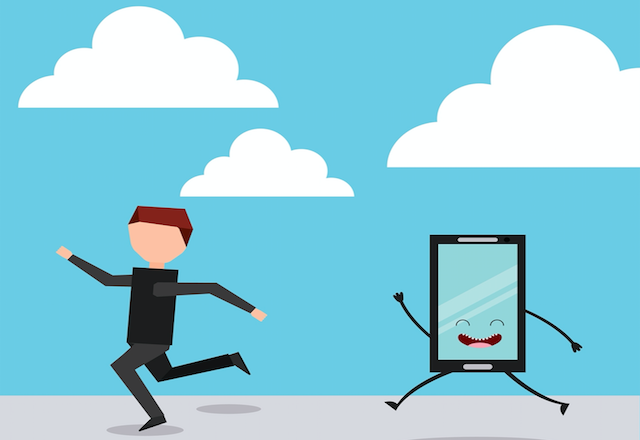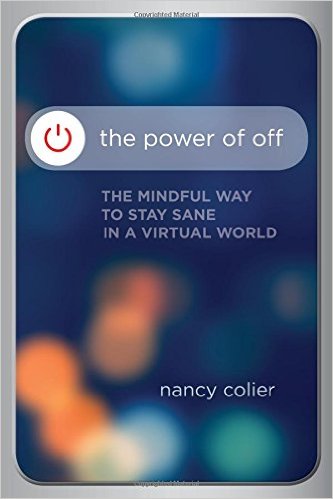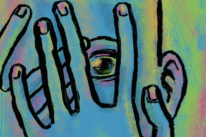
UPDATE: The winners for this giveaway have been chosen. They are: Akshay Bhat and Kaitlyn.
Have you ever found yourself mindlessly surfing the web, hopping from one site to another, when you didn’t have any specific reason to be online?
Maybe you were looking at a cute cat video on Facebook, and then you ended up taking a quiz to determine which Westworld character you are. And then, five listicles, four memes, three tweets, two comments, and one hour later, you realized you’d spent a whole lot of time doing a whole lot of nothing.
Worse, you may have been somewhere surrounded by people, and yet you still felt compelled to seek the kind of stimulation that feels unique to a glowing screen.
It’s like a tiny world inside your pocket, full of information and opinions and conflict, overflowing with stuff to consider and debate and buy, and it can be incredibly addictive.
As someone who works online, I have struggled with this myself. I promote and practice mindfulness, and yet I have found myself using technology in a compulsive way, distracting myself with emails, social media, and the pursuit of more information.
Sometimes I recognize my behavior and am able to disengage. Sometimes I don’t. I know I am not alone.
We are living in the age of constant connection, and ironically feeling more disconnected than ever—from ourselves, from the people around us, and from the world at large.
But it doesn’t have to be this way. We can learn to use technology mindfully, for good, with greater awareness and with fewer negative consequences in our lives.
If, like me, you’ve set this goal for yourself, I highly recommend you check out The Power of Off: The Mindful Way to Stay Sane in a Virtual World.
Written by psychotherapist Nancy Collier, The Power of Off outlines a process for using technology without compromising our overall well-being, our relationships, or the other things that matter to us in life.
The book explores:
- How and why today’s devices push our buttons so effectively, and what you can do to take back control of your life
- Tips for navigating the increasingly complex ways in which technology is affecting our relationships—with ourselves, others, and our devices themselves
- Self-evaluation tools for bringing greater awareness to your use of technology
- Mindfulness practices for helping you interact with your devices in more conscious ways
- A thirty-day digital detox program to kick-start a new healthier relationship with technology
I believe this book is a must-read for anyone who owns anything with a screen, or has access to one.
I’m grateful that Nancy offered two copies of her book for Tiny Buddha readers, and that she’s shared a little about her experience and her book.
 THE GIVEAWAY
THE GIVEAWAY
To enter to win a copy of The Power of Off:
- Leave a comment below. You don’t have to write anything specific. “Count me in” is sufficient!
- For an extra entry, share this interview on one of your social media pages and include the link in your comment.
You can enter until midnight PST on Sunday, December 11th.
*Winners outside the US will receive a digital copy, not a print book.
THE INTERVIEW
1. You admit to being addicted to technology. That’s one of the reasons that you wrote this book. Can you give us a sense of your addiction and what it was like for you before you transformed it?
I was an email addict, checking email far more often than what I was receiving warranted. I experienced a hit of pleasure every time I checked; even just thinking about checking delivered a shot of feel-good chemicals into the reward center of my brain, triggering what I call “lottery brain.”
Just the possibility that something wonderful might appear in my inbox kept me coming back for more, even if it never delivered.
I once walked by my own children at the end of a workday, with not much more than a quick hello, to get a fix from my addiction. It was at that moment that I realized that I was not okay with the way I was living, the choices I was making.
I woke up in that moment to the reality that what I was paying attention to and where I was putting my time and energy was not in alignment with what actually mattered to me.
It was then that I knew I needed to wake up and start making more mindful choices, to consciously create a handshake between what was most important to me and the way that I was living.
2. You say that our society has an addiction to technology and that it’s no different than an addiction to food, sex, drugs and alcohol.
An addiction is a behavior that we act out without awareness, either out of habit or impulse or both. We use technology without consciously deciding if we genuinely want to use, simply because the thought arises to use.
This is the nature of addiction, and all addictions cause our lives to shrink and eventually deplete our lives as they become more and more about our substance of choice and less about those elements that truly nourish us.
Technology is no different than any other addiction. It is, however, more like an eating disorder than an alcohol or drug addiction, because we have to find a way to incorporate our substance into our life. We cannot simply do without it, but rather, must find freedom in technology not from technology.
The only difference between this addiction and other addiction is that we have all drunk the Kool-Aid; we’re all in. This is a condoned addiction.
Other addictions put you outside the societal norm; they exclude you from being included. Tech addiction offers just the opposite, membership in the club. Tech addiction makes you part of the club, an insider, which makes it that much harder to break. The consequences of tech addiction may prove harder to acknowledge and take seriously.
3. Can you explain how an addiction to one’s phone is just as serious as a drug or alcohol addiction?
The negative consequences of a tech addiction are no different than the negative consequences of any other addiction.
-The addiction keeps you from being present in your life as more and more of your attention goes into getting your fix.
-The addiction occupies your time and energy, at the expense of other important parts of life (hobbies, activities, friendships, spiritual pursuits) that previously brought satisfaction, enjoyment and nourishment.
-The addiction causes negative effects on your health, work, social or family life.
-The addiction causes negative effects on your psychological wellbeing including mood swings, depression, anxiety, aggression, insecurity.
4. What are signs that one is addicted to technology?
Ask yourself:
-Is your reliance on technology increasing?
-Do you experience withdrawal symptoms when not able to use?
Are you continuing to use technology despite knowing that its causing impairment in your work, health, social, and/or family life?
-Is your life increasingly revolving around technology?
-Have you given up activities you used to enjoy to be able to use technology instead?
-Are you lying about the extent of your use?
5. You use the term TWIRED. Tell us what it is and how it feels to be “Twired.”
To be “twired” is to be simultaneously tired and wired. When we are twired, which most of us now are, we feel exhausted and overwhelmed, spent, and depleted, but also anxious and amped up, over-stimulated and buzzy. The experience of being “twired” is uncomfortable and ungrounded, which is what now is considered normal.
6. You are not advocating not using technology, but how to have a healthy relationship. How does one go from full force addiction to living a balanced, healthy life along with technology?
We must shift our relationship with technology so that when the thought or impulse to use arises, rather than just acting on it, we can use it as an opportunity to develop more self-awareness.
If I am standing in line and the thought arises—Oh, I could check my email, or shoot out a text, or look something up on Wikipedia—instead of obeying the thought out of habit and doing what it tells me to do, I could simply notice the thought itself without acting on it. I could use the thought to point me to the present moment, as in: What is here right now that is making me want to distract myself? Or: What would I have to feel if I didn’t use right now?”
The appearance of my addictive thought can then turn into a portal to awakening and mindfulness rather than a portal back into my addiction.
7. Is it true that studies show people would rather give up their friends, wine, even sex for a Wi-Fi connection?
Yes. One in three of all people would rather give up sex than their phone. Half of millennials would rather give up their sense of smell than their phone. Most millennials would rather give up their pinky finger than their phone. The majority of millennials would rather give up friends, alcohol, exercise, music, movies and TV, going out, and dessert, for a month than their Wi-Fi.
8. You say that technology is the antithesis of mindfulness, and that our culture’s recent interest in yoga is a result of technology making us feel disconnected. Can you explain?
We talk a lot about mindfulness these days in our culture, but the way we are living with technology is actually the antithesis of mindfulness. Mindfulness is the act of paying attention on purpose to the present moment, and doing so without judgment.
Most of us are spending our time staring at a screen, which takes us away from what is happening right in front of us. We are living in the virtual world and missing out on the world that our body is actually inhabiting.
If we are not staring at our personal screen, we are using our experience to build our personal brand, walking on a country road looking for places to take selfies so we can post on social media and show everyone how we are the kind of person that take country walks.
If we are not using life to build our personal identity/brand, we are busy taking photos of and capturing our life so we can show everyone the life we are living. We end up then with 64 gigabytes of iPhoto file memories but no direct experience of life lived.
The cost of this relationship with life, however, as something we can possess or use in service of our identity, is the direct experience of life itself. We end up, therefore, with the concept of mindfulness as something else we use to prove that we are a mindful person, but without the practice of mindfulness, which is living the moment as it is actually happening.
The way we are using technology is also causing us to become disembodied; that is, entirely identified with our minds and thus controlled by our thoughts, as if we were just little heads floating around in cyber-space.
Technology offers us a smorgasbord for the mind through data, entertainment, information, and just plain stuff to think about and do. The more technology we ingest, the more disembodied we feel.
Our fascination with yoga these days is an attempt to get back into and reconnect with our bodies, to feel grounded in our direct, physically-lived experience—to be where we actually are.
9. You talk about loosing a connection with our “self,” and how our obsession with our “personal brand” is very unhealthy. Can you please explain what you mean?
We now view our self as a kind of vacuum. Many people experience a sense of dread or terror when left alone with just themselves. We fill our lives with more entertainment, more information, more data, more of everything to avoid ever meeting just ourselves.
We no longer see ourselves as a destination, a place to inhabit. We fill ourselves up and derive our sense of meaning and worth from external sources, as in, the number of likes and followers we have.
We no longer process our lives internally. If we stop on the street and open a door for someone struggling with a stroller, rather than spending a few moments thinking about that experience or taking it in, owning and absorbing it, we now immediately post what happened with a #gratitude or #kindness.
We then wait to find out what the experience should mean and how we should think of it, how we should think of ourselves as a result of the feedback we receive. We ourselves are no longer a place we want to spend time or consider valuable.
What we care about now is how we are seen by others and how popular we are, not what we think or feel about ourselves. Our own experience has been vacuumed out by the technology that tries to defend it.
10. How can parents and teachers be of benefit to our children to help them learn to live “with technology” and not “for technology” as you might say?
We need to set limits with our children and model discernment and moderation. But also, to recognize that young people have no experience with another way of living and that their social, academic, and every other part of life happens online, so separation from their technological life can feel like death or non-existence.
What we need to do, besides setting clear rules that include periods of abstinence from technology, is to continue pointing our children to remain aware of how they feel in relationship with technology.
That is, asking our child how she feels after a full day of Snapchatting, Instagramming, and Facebooking, how it is when she’s with a friend who is constantly texting while they’re together, how well she can focus on her homework when simultaneously receiving dozens of notifications on her other devices, how her personality changes when she is asked to give up her phone and how she feels after a a day (or week!) off all technology.
We need to keep our children awake and tuned into how technology is affecting them so that they don’t lost touch with their own experience and forget that there is another way to feel besides the way that technology induces.
You can learn more about The Power of Off: The Mindful Way to Stay Sane in a Virtual World, here.
FTC Disclosure: I receive complimentary books for reviews and interviews on tinybuddha.com, but I am not compensated for writing or obligated to write anything specific. I am an Amazon affiliate, meaning I earn a percentage of all books purchased through the links I provide on this site.
About Lori Deschene
Lori Deschene is the founder of Tiny Buddha. She started the site after struggling with depression, bulimia, c-PTSD, and toxic shame so she could recycle her former pain into something useful and inspire others to do the same. You can find her books, including Tiny Buddha’s Gratitude Journal and Tiny Buddha’s Worry Journal, here and learn more about her eCourse, Recreate Your Life Story, if you’re ready to transform your life and become the person you want to be.
- Web |
- More Posts













 Though I run this site, it is not mine. It's ours. It's not about me. It's about us. Your stories and your wisdom are just as meaningful as mine.
Though I run this site, it is not mine. It's ours. It's not about me. It's about us. Your stories and your wisdom are just as meaningful as mine. 